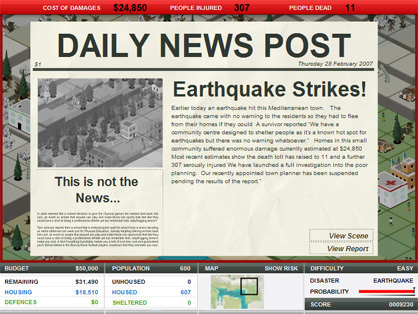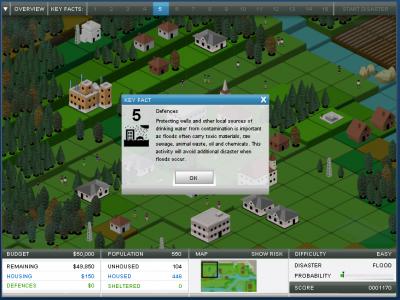Being ready for disaster when it strikes (and it will) can mean the difference between a life threatening situation and just a bad couple of days. Because we can not stop a flood, or a hurricane, or a tsunami, we must be ready instead to meet the challanges of the aftermath. It is hard however to educate people about what to do in order to help mediate these disasters. Lucky for us the United Nations is here to give us a hand. They have developed a handy little flash game called, Stop Disasters!

The games plays like sim city (seems the sim city model is good for all sorts of things, check out this companies use of the sim city model to plant trees in the sub Sahara). You play a town planner trying to get ready for a looming disaster. You can help plan against floods, tsunamis, earthquakes, wild fires, and hurricanes. Your job is to work within your budget and within a time period to get a community ready. During the game you discover facts about disaster preparedness, the more facts you uncover the more points you get. Learning gets you points!
It reminds me a lot of the BBC game about climate change where you learn how hard it is to make government policy regarding global warming. These games do an excellent job of at once showing you so many things that can be done to solve these problems, and showing you the difficulty in doing them. Games and game designers clearly have a massive untapped market here. The realistic game for change market. There are some people working towards things like this, but the big players in the market still seem to be trying to produce the same old same old.
What I would like to see is a massive multiplayer online game where people team up to play a sim city like game where they help the world. For instance you would start over a giant map of the world, tiny glowing dots would represent “games” going on around the world. You would see one glowing in central Africa. You click the glowing dot and are transported to the “small African village level.” There you see that other players are trying to get the town a clean supply of drinking water, and some solar panels. You would help out by contributing “Earth Dollars” to the project (which you buy with real dollars, similar to the system in Second Life).
The game would then show you how much closer you are to getting that task done. The kicker would be that at the end of every month the people who run the game would team up with various non-profits and the UN to actually take the money people have spent in the game and spend it in real life. As more non-profits teamed up with the game makers more “levels” would become available, more “scenarios” would be available to play you could even have people from the various game sites (the people being effected by the game) get online and speak to the players sort of like NPC’s only real.
I know its rather blue sky but I could see a system like this working with the proper marketing. Micro-payments have been shown to work for other things. And players could compete for most projects completed, try to get the best “stats” (things like lower AIDS infection rate, more housing, higher education rates), and the designers could work in other mini-games that have less to do with reality that players can engage in while they wait for the real world to catch up with the game world. These games could also be tied into how you are doing in the “real” game.
Any game coders out there interested in realizing this vision? Contact me and we can chat about it.

3 thoughts on “An Ounce Of Prevention – Teaching People About Disaster Preparedness With Video Games”
Comments are closed.